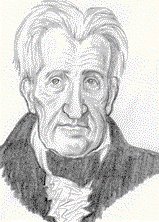Old Hickory

Andrew Jackson, the 7th U.S. President, was born on this day in 1767 in the Waxhaws, along the border of North and South Carolina. The question of just which state is apparently left to be decided in an annual high school football game between teams on either side of the border.
Andrew Jackson was a larger-than-life character: scarred, battle-tested and in no way affiliated with the powdered-wig wearing Viriginia elite who held sway over American politics until his arrival upon the scene, he was a man whose emotions were almost never reigned in, and whose strength of personality was to dominate the political landscape during the 1820s and 30s.
Jackson's father died before he was born. At 13, he joined his brothers in the Continental Army to fight the British, but was quickly taken prisoner. When he defied an order to clean a British officer's boots, the officer whacked Jackson with his sword, leaving gashes on his head and hand as permanent reminders of the cruelty of the British. Jackson's mother died shortly thereafter; and at 14, having lost his brothers in the Revolution, Jackson was completely alone in the world. The following year he surprised to find that he had inherited £350 from his grandfather in Ireland, but Jackson squandered it gambling and carousing in Charleston.
After that chastening experience, Jackson was determined to make something of himself. He studied law, entered the bar, and soon thereafter entered politics, serving a prosecutor, Congressman and judge during the 1790s. Throughout his professional life, Jackson had trouble taming his violent temper, and was prone to dueling. Thomas Hart Benton wounded him in the arm in one famous encounter; in another, a bullet from the gun of Charles Dickinson was lodged in Jackson's chest, too close to his heart to remove. When hit by Dickinson during a duel over the reputation of Jackson's wife, Rachel Robards (Dickinson had repeated the long standing rumor that Jackson and Robards had lived together as man and wife before Robards' divorce from her first husband was final), Jackson stood up straight and rather unchivalrously killed Dickinson with one shot to the abdomen.
Jackson's military career ran parallel to his political career. He served as major general of the Tennessee militia, and unwittingly became involved in Aaron Burr's ill-fated conspiracy to start a new republic in the West when he provided Burr with troops on Burr's assurance that the U.S. was merely preparing to defend against a potential Spanish invasion. In the War of 1812, Jackson was a bona fide military hero, winning the most decisive victory over the British at the Battle of New Orleans in 1815 -- although he was criticized for imposing martial law on the city, executing deserters and ignoring a federal writ of habeas corpus.
He returned to Washington as senator from Tennessee, and ran unsuccessfully for president against John Quincy Adams in 1824: although Jackson had carried the popular vote, the election was thrown into the House of Representatives because none of the four candidates (Adams, Jackson, Henry Clay and William Crawford) had received an electoral majority, and Adams was declared the winner.
In 1828, Jackson's humble frontier origins and war record were again pitted against the cold, intellectual persona of Adams, and this time Jackson won the day (with assistance from Martin Van Buren in New York and John C. Calhoun in the South) in the first presidential election to be decided largely by popular taste.
As president his effectiveness was derailed for a time by a scandalous romantic affair involving his Secretary of War John Eaton, until Eaton resigned in 1831. Jackson, however, viewed as his greatest accomplishment the destruction of the Bank of the United States in 1832, which Jackson saw as an elitist institution, inappropriately sponsored by the federal government, which favored Eastern manufacturing interests at the expense of working men and women. The Senate censured Jackson for his conduct in hastening the demise of the Bank. The dissolution of the Bank put an end to conservative monetary policies, originally designed by Alexander Hamilton based on the Bank of England, brought about an increase in available credit, and probably contributed to the Panic of 1837. Jackson killed the Bank so definitively that the concept was not successfully revived until Woodrow Wilson was president 80 years later. Jackson also presided over the tariff crisis, in which politicians in the South questioned the right of the federal government to impose tariff duties within the states; surprisingly, Jackson was a staunch federalist over this issue, going so far as to obtain from Congress the power to use armed force to collect the duties. The crisis was a foreshadowing of the states rights' crisis which grew into the Civil War some 30 years later.
After a second term as president, Jackson handpicked Martin Van Buren as his successor and retired to his plantation outside of Nashville, the Hermitage, emerging to promote the career of James K. Polk and to lobby for the annexation of Texas. He died June 8, 1845 at the Hermitage.
Categories: US-Presidents, American-Politicians, Presidential-Campaigns





0 Comments:
Post a Comment
Subscribe to Post Comments [Atom]
<< Home